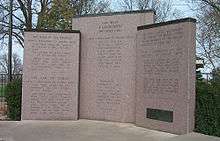The Church of Jesus Christ of Latter-day Saints in Missouri

As of the end of 2007, The Church of Jesus Christ of Latter-day Saints reported 62,217 members in 14 stakes,[1] 143 Congregations (104 wards[2] and 39 branches[2]), 2 missions, and 2 temple (St. Louis and Kansas City, Missouri).[3]
History
There were many Mormons in Missouri and it served as one of the headquarters of The Church of Jesus Christ of Latter-day Saints in the 1830s. In 1838 Lilburn W. Boggs issued the Extermination Order to drive Mormons from the state, and for a time there was no organized Church presence here.
Later in the 1840s members of the Church, both immigrants from Britain and migrants from Nauvoo, Illinois moved to St. Louis, Missouri and a branch was organized there in 1844. In 1852 the steamship Saluda exploded near Lexington, Missouri with many of those killed being Latter-day Saints headed towards Fremont, Nebraska to then outfit to go to Utah.
By 1849 there were over 3,000 Latter-day Saints in the St. Louis area, and in 1854 a stake was organized there with Milo Andrus as president. Among those baptized in Missouri about this time was Henry Eyring a German immigrant who would latter lead Latter-day Saint missionary efforts among the Cherokee in Oklahoma and many of whose descendants would be prominent latter in the LDS Church. In 1858 the stake was dissolved and most of the Mormon migrated to Utah.
In the late 19th century there was limited missionary presence. However from 1904 a mission was headquartered in Independence. In 1911 a branch was organized there with Joseph F. Smith dedicating a chapel in 1914. Shortly after this Spencer W. Kimball, later president of the Church, served a mission in Missouri.
The church began to expand in the 1920s with five new chapels dedicated in 1926 and 1927. The first Missouri stake was organized in Kansas City in 1956 with another organized in St. Louis in 1958. Columbia, Missouri got a stake in 1970, the Independence Stake was split from the Kansas City stake in 1971 and a stake was organized in Springfield in 1973. The first LDS temple in Missouri was dedicated by Gordon B. Hinckley in the St. Louis area in 1997.[4]
For much of the early 20th century Liahona The Elders' Journal was published in Independence, Missouri this was the main LDS publication aimed at church members living in the United States outside of the Mormon corridor.
Missouri Membership History
| Year | Membership |
|---|---|
| 1974 | 13,796 |
| 1980 | 25,243 |
| 1990 | 35,084 |
| 1999 | 51,187 |
| 2008 | 63,666 |
Missions
| Mission | Organized |
|---|---|
| Missouri Independence North Mission | 4 Apr 1904 |
| Missouri St Louis Mission | 1 Jul 1977 |
Temples
Missouri currently has two operating temples and three in which construction has been indefinitely suspended.
|
|
50. St. Louis Missouri | ||
|
Location: |
Town and Country, Missouri, US | ||
|
|
137. Kansas City Missouri | ||
|
Location: |
Kansas City, Missouri, United States | ||
|
|
Independence (Efforts halted in 1830s) | ||
|
Location: |
Independence, Missouri | ||
|
|
Far West (Efforts halted in 1830s) | ||
|
Location: |
Far West, Missouri, United States | ||
|
|
Adam-ondi-Ahman (Efforts halted in 1830s) | ||
|
Location: |
Adam-ondi-Ahman, Missouri | ||
See also
- Independence, Missouri
- Jackson County, Missouri
- Far West, Missouri
- Adam-ondi-Ahman
- Caldwell County, Missouri
- Daviess County, Missouri
- Mormon War (1838)
- Haun's Mill massacre
- Extermination order
- Liberty Jail
- Evening and Morning Star
- Joseph Smith
- Zion's Camp
References
- ↑ Missouri Stakes.LDS Stake & Ward Web Sites
- 1 2 LDS Meetinghouse Locator
- ↑ LDS Newsroom (Statistical Information)
- ↑ LDS Church Almanc, published by the Deseret News, 2011 edition, p. 360-361
- ↑ Mikita, Carole (October 4, 2008). "LDS Church plans temples in Rome, 4 other locations". KSL.com. Retrieved 2012-10-15.
- ↑ Burnes, Brian (May 8, 2010). "Groundbreaking planned for Mormon temple in Northland" (NewsBank paywall). The Kansas City Star. p. A5. Retrieved 2012-10-15.
- ↑ History of the Church of Jesus Christ of Latter-day Saints (aka Documented History of the Church "DHC") 1:357-362 or James R. Clark, Messages of the First Presidency, Vol.1, p.6-10 where full architectural descriptions are given.
External links
- LDS Newsroom (Missouri), includes brief history of LDS in Missouri
- The Church of Jesus Christ of Latter-day Saints - Official Site
- The Church of Jesus Christ of Latter-day Saints - Visitors Site




